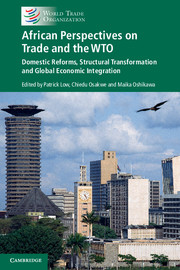 African Perspectives on Trade and the WTO
African Perspectives on Trade and the WTO Book contents
- African Perspectives on Trade and the WTO
- African Perspectives on Trade and the WTO
- Copyright page
- Contents
- Figures
- Plates
- Contributors
- Message
- Joint Foreword
- Book part
- Glossary
- Disclaimer
- 1 Introduction and Overview
- Part I The Future of the Multilateral Trading System: Perspectives from African Policy-Makers and Partners
- 2 African Union Priorities at the WTO
- 3 Economic Diversification in Africa’s Number One Economy
- 4 Trade, Investment and Development
- 5 Integration into Global and Regional Value Chains – How Is It Done? The Experience of Lesotho in the Textiles and Apparel Sector
- 6 From Marrakesh to Nairobi: Africa – A Force for the World Trading System: From the Past Twenty Years to the Next Twenty Years
- 7 Building Capacity in Africa to Facilitate Integration into Global Value Chains: Contributions from the ITC
- 8 Investment and Trade Rules: Increasing the Stock of African Foreign Direct Investment Flows
- 9 Deepening African Integration: Intra-African Trade for Development and Poverty Reduction
- Part II Africa’s Participation in the Rules-Based Multilateral Trading System
- Part III Selected Development Experiences and Perspectives
- Book part
- Index
- Plate Section (PDF Only)
- Book part
- References
9 - Deepening African Integration: Intra-African Trade for Development and Poverty Reduction
from Part I - The Future of the Multilateral Trading System: Perspectives from African Policy-Makers and Partners
Published online by Cambridge University Press: 27 October 2016
- African Perspectives on Trade and the WTO
- African Perspectives on Trade and the WTO
- Copyright page
- Contents
- Figures
- Plates
- Contributors
- Message
- Joint Foreword
- Book part
- Glossary
- Disclaimer
- 1 Introduction and Overview
- Part I The Future of the Multilateral Trading System: Perspectives from African Policy-Makers and Partners
- 2 African Union Priorities at the WTO
- 3 Economic Diversification in Africa’s Number One Economy
- 4 Trade, Investment and Development
- 5 Integration into Global and Regional Value Chains – How Is It Done? The Experience of Lesotho in the Textiles and Apparel Sector
- 6 From Marrakesh to Nairobi: Africa – A Force for the World Trading System: From the Past Twenty Years to the Next Twenty Years
- 7 Building Capacity in Africa to Facilitate Integration into Global Value Chains: Contributions from the ITC
- 8 Investment and Trade Rules: Increasing the Stock of African Foreign Direct Investment Flows
- 9 Deepening African Integration: Intra-African Trade for Development and Poverty Reduction
- Part II Africa’s Participation in the Rules-Based Multilateral Trading System
- Part III Selected Development Experiences and Perspectives
- Book part
- Index
- Plate Section (PDF Only)
- Book part
- References
Summary
The obstacles to deeper African integration are great, but the potential gains for development and poverty reduction warrant a sustained effort to overcome these challenges. High trade barriers between countries have been reflected in trade that is more oriented toward distant markets than neighbouring African countries – it is often easier for Africans to trade with the rest of the world than with each other. The potential exists for greater intra-African trade in ways that would have significant, positive impacts on the lives of millions living in poverty. Barriers to intra-regional trade need to be tackled, along with complementary efforts to ensure that the poorest people can access the opportunities created. The World Bank Group is working in a number of different areas to support this effort and is ready to do more.
- Type
- Chapter
- Information
- African Perspectives on Trade and the WTODomestic Reforms, Structural Transformation and Global Economic Integration, pp. 59 - 66Publisher: Cambridge University PressPrint publication year: 2016


